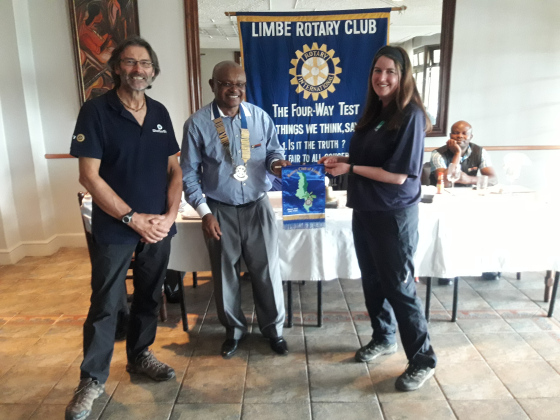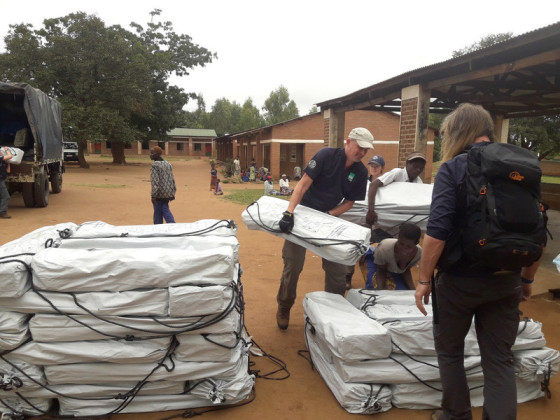Story by: Jim Robinson, Humanitarian Diplomacy and Rotary Liaison at ShelterBox
 I want to tell the story of our partnership with Rotary, through the recent response to Cyclone Idai in Malawi.
I want to tell the story of our partnership with Rotary, through the recent response to Cyclone Idai in Malawi.At the core of how ShelterBox operates is the principle of partnership – for an effective and timely response, it is crucial. Responding in Malawi was built on this principle.
President Eric Chinkanda, RC Limbe (centre) with ShelterBox Response Team (Mick Dunn and Sonja Hughes)
Rotarians, as People of Action, support our work providing shelter to those who most need it in many ways from raising awareness and funds, to the first-hand knowledge Rotarians have of the communities we look to support. Rotarians have supported ShelterBox responses with introductions, logistical assistance such as warehousing, transport and vital links to communities
 Arriving in country, ShelterBox team members met with District 9210’s Governor Hutch Mthinda in Lilongwe and alongside national level meetings with the Government Disaster Management Agency (DODMA) and Habitat for Humanity Malawi, began to develop both the relationships and strategy to best respond to the havoc wrought by Cyclone Idai in the southern districts of Malawi.
Arriving in country, ShelterBox team members met with District 9210’s Governor Hutch Mthinda in Lilongwe and alongside national level meetings with the Government Disaster Management Agency (DODMA) and Habitat for Humanity Malawi, began to develop both the relationships and strategy to best respond to the havoc wrought by Cyclone Idai in the southern districts of Malawi.Transferring south to Blantyre, we received a warm welcome from the Rotary Club of Limbe. President Eric Chinkanda welcomed us as his guests and conversations began. After giving a short introduction to the larger club, our focus turned to an initial meeting with the Disaster Response Committee, charged with coordinating the Rotary members’ response to Cyclone Idai in Malawi.
One of the early objectives for ShelterBox teams is to understand what has happened and where, and who are the most affected communities. As we do this, we can begin to form a picture of where our assistance can be most effective and appropriate. Early conversations with partners enable each of us to understand priorities. With the Rotary Club of Limbe raising funds to carry out a food distribution, we explored ways to support them by connecting them with relevant government and humanitarian actors.
President Eric says,
“I was, as leader of our District Disaster Relief Team, supported by ShelterBox in their early contacts with DODMA, which provided us situation analysis and needs assessment reports. We were able to move forward speedily with the food aid. Between ShelterBox and Rotary, we worked together and agreed on which team had to handle specific assignments. We scored pretty good successes through this understanding of specialization.” In practice, this meant that we kept on talking, sharing information, contacts, experiences, challenges and successes, for ShelterBox, having trusted partners to help us understand